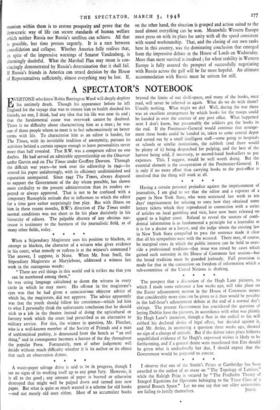A SPECTATOR 'S NOTEBOOK E VERYONE who knew Robin Barrington Ward
will deeply deplore his untimely death. Though his appearance before he left England for the voyage that was to restore him to health shocked his friends, no one, I think, had any idea that his life was near its end ; that the fundamental cause was overwork cannot be doubted. There is no difficulty about characterising him as a man ; he was one of those people whom to meet is to feel subconsciously on better terms with life. To characterise him as an editor is harder, for The Times, with its inviolable tradition of anonymity, pursues its activities behind a curtain opaque enough to leave personalities never more than half revealed. That B.W. was a competent editor no one doubts. He had served an admirable apprenticeship on the Observer under Garvin and on The Times under Geoffrey Dawson. Through the difficult war years—he took over the editorship in 1941—he steered his paper unfalteringly, with its efficiency undiminished and reputation unimpaired. Since 1945 The Times, always disposed to support the Government of the day where possible, has shown more cordiality to the present administration than its readers ex- pected or always approved. That is not to be confused with a temporary Russophile attitude due to influences to which the editor for a time gave rather surprisingly free play. But with illness on him in these recent months, B.W.'s direction of The Times under normal conditions was too short to fix his place decisively in his hierarchy of editors. The palpable absence of any obvious suc- cessor is testimony to the bareness of the journalistic field, as of many other fields, today.






























 Previous page
Previous page